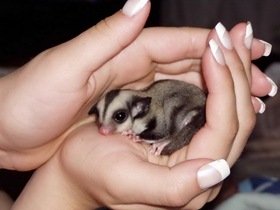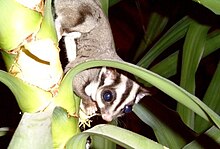1.Sugar glider
 These popular little marsupials from northeast Australia weigh no more than about five ounces. Their lively and curious nature helps them to bond easily with humans. Unfortunately, they’re also social and nocturnal, and want your attention when you can’t give it — at night. For that reason, it is recommended that you keep at least two
These popular little marsupials from northeast Australia weigh no more than about five ounces. Their lively and curious nature helps them to bond easily with humans. Unfortunately, they’re also social and nocturnal, and want your attention when you can’t give it — at night. For that reason, it is recommended that you keep at least two
.
Owners should also provide an environment with branches or vines to satisfy the sugar glider’s desire to climb. Additionally, their diet is a subject of some controversy among vets and nutritionists. The only agreement between these parties is that the diet should include protein, insects and various vitamins and minerals.
Pet peeve: When gliders eat, they suck what they need from the food and spit out the rest. As a result, bits of crescent-shaped gunk pile up on the floor around the cage and stick to the walls.
2.Kinkajou
This nocturnal rainforest mammal is friendly and affectionate by nature and, therefore, enjoys some popularity among exotic-pet owners.
Despite their sharp, carnivorous teeth they eat bananas, eggs, mangoes, Fruit Loops, marshmallows, and gummi bears. This preserves their wicked, bacteria-loaded bite for when threatened or scared. If you harbor doubts, just ask Paris Hilton: Her kinkajou sunk its teeth into her arm and sent her to the ER.
Pet peeve: The kinkajou’s nocturnal chattiness has been known as la llorona for centuries. If your Spanish is rusty, it means ”the crying woman.” Need I say more?
3.Squirrel monkey
Hailing from Central and South America, the squirrel monkey is omnivorous, preferring to eat fruits, nuts, bird eggs, and small vertebrates. Measuring in at about 2.75 pounds, they have a number of predators, which is one reason they run with a posse that can number as high as 500.
Speaking proportionately, they have the largest brain of all the primates (that includes humans). Couple that intelligence with a social and affectionate nature, and things like house-training come relatively easy to this monkey.
Pet peeve: Any method of marking territory that a pet has is bound to be a peeve, but when the squirrel monkey does it, he rubs his tail and skin into the urine. As a result, he’ll mark any place he goes next, like your lap.
4.Bengal cat
No relation to the Bengal tiger, the Bengal cat is a hybrid creation featuring pre-designed genetic characteristics that are crossbred with the likes of something more exotic, such as the Asian leopard cat. The result is a new feline breed that acts much like a mellow domestic, but looks like he just walked off the Savannah plains. Variations include the Serengeti, the toyger, and the cheetoh. The more pure-bred the cat, the more costly; one sold for $42,000 in 1998.
Although some consider the Bengal cat’s disposition more like a dog, and thus, more of a man’s pet, I can’t help but detect a woman’s hand behind this breed; it’s like the feline equivalent of the sensitive, domesticated boyfriend dressed up like a dangerous bad boy.
Pet peeve: There are no complaints beyond the typical ones associated with cats, such as watching your nice furniture shredded to bits by claws.
5.Ball python
There are two types of people: those who like snakes as pets and those who don’t. It’s doubtful that the red eyes or exotic colors of some of these rare variations will entice the uninterested. After all, ownership in this case means keeping your 5-foot-long ball python in a 30 gallon tank and feeding it dead mice, rats or gerbils every 10 days for the next 30 years.
Pet peeve: Your $40,000 lavender albino ball python has refused to eat. Out of options, you take the breeder’s advice and scalp a dead rat, since seeing the brains of his prey might be enough to entice him to eat.
6.Mona monkey
This West African native is an Old World monkey who peaks out at about 15 pounds and lives into his early 20s.
Like any monkey, he needs to move those crazy limbs. Owners should provide them with an enclosure that permits climbing, swinging, goofing around, and even hiding. His diet is fairly basic, consisting of pumpkin and sunflower seeds, fruits, and insects. The most difficult job may be monkey-proofing your home, since he can outsmart or out-jiggle most baby-proof methods.
Pet peeve: Enjoy his broad range of vocalizations, which include a loud, expressive lament, a danger alert that sounds like a sneeze, and a territorial boom and hack
7.Hyacinth macaw
The hyacinth macaw can’t dance, roller-skate or ride a unicycle like Big Bird, but he’s still big. The hyacinth macaw weighs in at four pounds, and the world’s largest parrot species also enjoys a tremendous four-foot wingspan. Not only that, but his beak is so strong that it bends the bars of most cages without much effort.
This South American native mates for life, is easily domesticated and will probably outlive you. In the wild, he eats the nuts from two kinds of palm trees, but one of them, the acuri,
he only eats after it has passed through the digestive system of another animal.
Pet peeve: How long will it take before harvesting the recycled acuri nut gets old?
8.Reticulated python

Hailing largely from Thailand and Indonesia, reticulated pythons represent the longest known species of snake in the animal kingdom. And just how do you keep this monster happy?
Start with a fairly large tank for a habitat in which humidity levels and high temperatures must be regulated with some discipline. Adults don’t need to eat very often, only every 10 to 14 days, and when they do, they prefer dead guinea pigs, rabbits and big rats.
Pet peeve: Breeders recommend getting a second person to help you feed your reticulated albino type II tiger python; someone needs to call an ambulance when it mistakes you for a carcass.
9.White Lion
According to Forbes, as a pet this cub is the world’s costliest animal.
The white lion is not a species unto itself; he’s your standard lion with a potentially fatal flaw. The flaw is a recessive gene that alerts both potential prey (wildebeests, hippos and adult elephants) as well as predators (hunters) to his presence.
The problem with raising a cub is the same as raising some puppies — they grow up. In the case of a white lion, that can mean reaching 500 pounds.
Pet peeve: Some lions are more prolific man-eaters than Jeffrey Dahmer.
10.Chimpanzee
Eerily analogous to humans in life span, behavior and even DNA (we share 94%), chimps have a hold on human fascination and attract the likes of scientists, zoo-goers and potential pet owners. This remarkable similarity also hints toward why they make for such problematic and unmanageable pets.
A chimp can be house-trained, but he’s intelligent enough to have a mind of his own. If he wants to raid the fridge, but fails to outwit you, his 115-pound frame has another option — take it by force.
His average upper-body strength is five times that of a human. With a more sophisticated gripping capacity he could show you up at the gym, but why bother? He can just maul you to death.
Pet peeve: You’re showing him off to friends. Then for whatever reason, he appears smarter than you, and your friends laugh. The chimp vocalizes — who knows why — and it sounds like he’s laughing too.










No comments:
Post a Comment